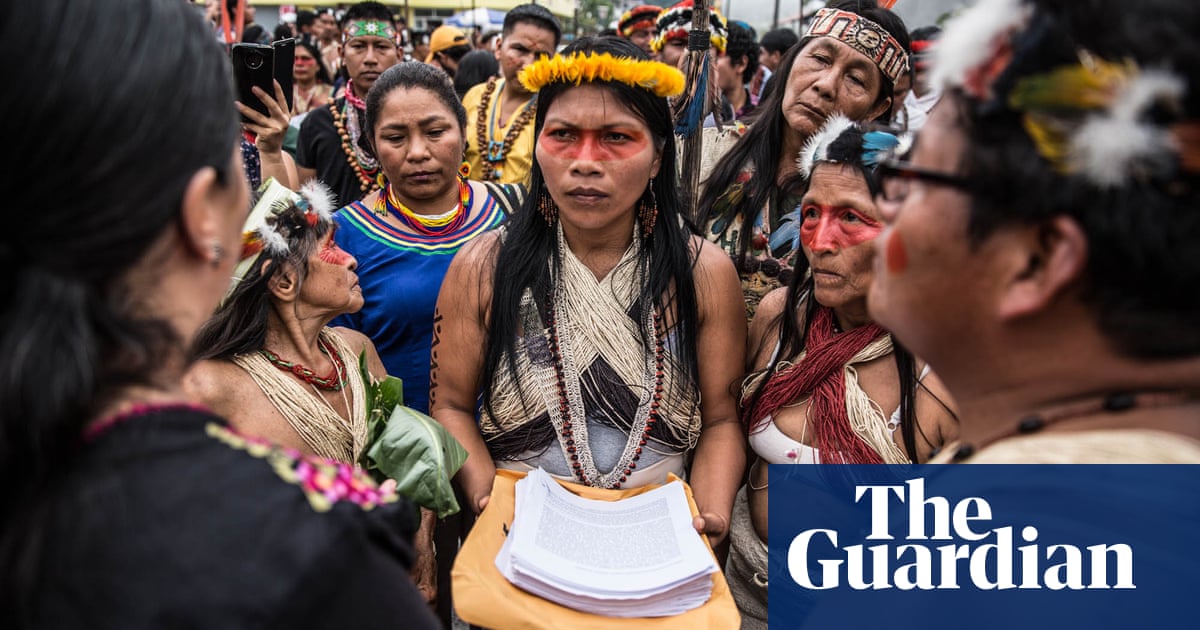There’s great joy as well as pain in this luminous story of Indigenous life and the battle against exploitation
When Nemonte Nenquimo was little, she and her sisters and brothers would hear planes flying over their village in the Amazon and race one another to the nearby landing strip to see who was arriving. Only white people – known as cowori – travelled by plane, and they would bring gifts of candy, clothes, earrings and dolls with blond hair. Over the years, they brought other things too: God, polio, alcohol and oil executives waving contracts allowing them to plunder indigenous land for its oil reserves. One village elder reported signing papers with his thumbprint after being given bread and Coca-Cola and assured that the oil companies would build schools and medical clinics.
In her richly detailed memoir, written with and translated by her American partner Mitch Anderson, Nenquimo documents her path from early childhood in a Waorani village deep in the Ecuadorian rainforest to becoming an environmental activist, named in 2020 as one of Time magazine’s 100 most influential people. The Waorani tribes, which live traditionally as nomadic hunter-gatherers, once claimed the largest territories of all Indigenous Amazonians in Ecuador – land that was among the most biodiverse on Earth. But that was before it was reduced by settlement, cattle grazing, oil extraction, gold mining and logging, and its rivers poisoned with oil. In 2019, Nenquimo helped win a historical lawsuit against the Ecuadorian government protecting more than[LJ add] half a million hectares of Waorani ancestral territory from being auctioned to oil companies. Continue reading...
http://dlvr.it/T7Xl2x
When Nemonte Nenquimo was little, she and her sisters and brothers would hear planes flying over their village in the Amazon and race one another to the nearby landing strip to see who was arriving. Only white people – known as cowori – travelled by plane, and they would bring gifts of candy, clothes, earrings and dolls with blond hair. Over the years, they brought other things too: God, polio, alcohol and oil executives waving contracts allowing them to plunder indigenous land for its oil reserves. One village elder reported signing papers with his thumbprint after being given bread and Coca-Cola and assured that the oil companies would build schools and medical clinics.
In her richly detailed memoir, written with and translated by her American partner Mitch Anderson, Nenquimo documents her path from early childhood in a Waorani village deep in the Ecuadorian rainforest to becoming an environmental activist, named in 2020 as one of Time magazine’s 100 most influential people. The Waorani tribes, which live traditionally as nomadic hunter-gatherers, once claimed the largest territories of all Indigenous Amazonians in Ecuador – land that was among the most biodiverse on Earth. But that was before it was reduced by settlement, cattle grazing, oil extraction, gold mining and logging, and its rivers poisoned with oil. In 2019, Nenquimo helped win a historical lawsuit against the Ecuadorian government protecting more than[LJ add] half a million hectares of Waorani ancestral territory from being auctioned to oil companies. Continue reading...
http://dlvr.it/T7Xl2x


Post a Comment